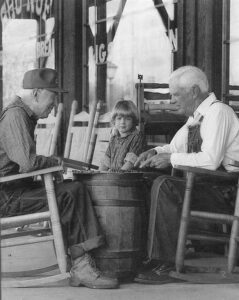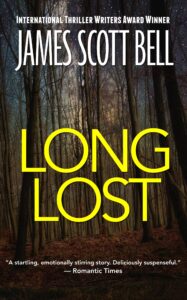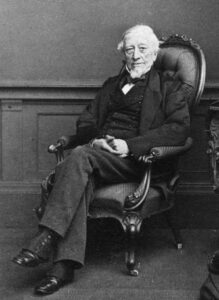by James Scott Bell
@jamesscottbell
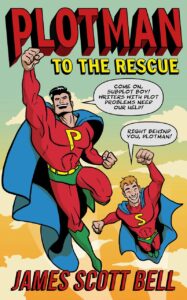 (Today’s post is adapted from the book Plotman to the Rescue: A Troubleshooting Guide to Fixing Your Toughest Plot Problems. It is used by the kind permission of the author.)
(Today’s post is adapted from the book Plotman to the Rescue: A Troubleshooting Guide to Fixing Your Toughest Plot Problems. It is used by the kind permission of the author.)
Here’s a question I get from time to time. What do I do if I’m in the middle of my novel and there are so many things happening, so many characters running around, that I’m losing my way?
You would think this question would come primarily from “pantsers,” the If-I-knew-what-my-story-was-about-before-I-wrote-it-I’d-be-bored school of writing. But it arises with the plotter, too, who has perhaps been overly ambitious in the planning. As sometimes happens for the plot engineers, a sudden twist or turn or character may try to horn in at, say, the 20k mark, throwing the whole outline off.
So what do you do when you discover you’ve a) gone down that infamous rabbit hole; b) have plot points or characters popping up you didn’t plan for; c) are lost in a dark forest; or d) have fallen off a cliff into the bleached bones of the author’s graveyard?
I will allow you one wail of frustration.
Now let’s get a handle on things.
First of all, where are you, as the ad men used to say, “outline wise”? Do not skip over this part, pantsers, for you better have an outline, too.
Wait, what?
I’m talking about a “rolling outline,” one you put together as you roll along. When you finish a scene or chapter, write a quick synopsis of who the viewpoint character is, what he wants and what happens, as in: Ishmael gets depressed, decides to go to sea, and sets off to find a ship.
Scrivener is ideal for this because you can put the rolling outline on scene “cards” and view them on a virtual corkboard. But Word or even Excel will work fine, too.
Now, if you feel your plot is getting away from you, print out the current version of the rolling outline and do this:
Clean House on Characters
How many viewpoint characters have you got? This means you have more than one character with a storyline of their own. For example, in a traditional romance you usually have two viewpoint characters, the lovers. In a long historical or fantasy novel, you may have three, four or more.
If this is so for you, precisely define the following: What is each character’s death-stakes objective? (Death being physical, professional, or psychological.) If it’s not death, find a way to make it so, or drop this as a plotline. In the alternative, consider taking away this character’s viewpoint scenes and converting that line into a subplot. This means the character shows up in scenes told from another character’s point of view and (this is crucial) complicates the viewpoint character’s objective.
For example, you have a woman as a viewpoint character, and a man as another viewpoint character. The man’s plotline is not working out in a death-stakes way. You might remove him as a viewpoint, but have him show up in the woman’s plotline as a potential lover or long-lost brother or secret agent or alien from a parallel universe.
Clean house. Keep only the crucial characters.
For further study: The Stand by Stephen King, and Strangers by Dean Koontz. You’ll see how these authors make the several character lines work on their own terms before bringing the strands together.
Cut Scenes That Don’t Connect to Plot
Now that you are squared away on the objective of the main character or characters, assess each scene you’ve written so far. Ask:
- Does the goal in the scene relate in some way to the overall, death-stakes objective of the Lead? If not, cut it.
- Does the scene present an obstacle to the attainment of the objective, emotionally or physically or both? If not, why is it there?
- If the scene is part of a subplot, how does it intersect with the main plot? How does it complicate matters for the Lead?
Write or Rewrite Your Pitch
If you’re a pantser, you may not have a pitch for your novel. After all, you’re still discovering what it’s about! Well, if you’ve done some thinking as this post suggests, you’ve made discoveries. Try putting them together in a pitch—250 words or less that would make someone interested in this story. Doing this will give you focus on where to go next.
If you’re an outliner, rewrite your pitch to include the elements you’ve uncovered. Get excited again about your journey.
Be sure to read Sue’s post on crafting a pitch.
Push On
Now finish your draft. Don’t do any more dawdling. You should have enough direction to push right on to the end. As you do, keep adding to your rolling outline. It will be helpful when you get to the editing stage.
Can you describe a time when your plot got away from you, or you felt lost? Is this a common occurrence for you? What do you do to get back on track?


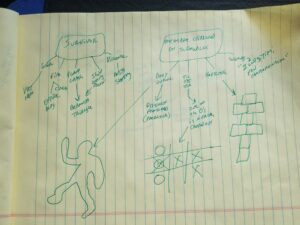

 A controversy over an award-winning female thriller author has broken out in Europe. That’s because the female thriller author doesn’t exist. “She” is really three men who have been writing under the pseudonym Carmen Mola. When one of their novels won a million-euro prize, the trio
A controversy over an award-winning female thriller author has broken out in Europe. That’s because the female thriller author doesn’t exist. “She” is really three men who have been writing under the pseudonym Carmen Mola. When one of their novels won a million-euro prize, the trio  I love a good epigraph. That’s the quotation some authors put on a standalone page right before the novel begins. It is not to be confused with an epigram, which is a pithy and witty statement. However, if placed at the front of a book, an epigram becomes an epigraph, thus epitomizing epiphenomena (secondary effects).
I love a good epigraph. That’s the quotation some authors put on a standalone page right before the novel begins. It is not to be confused with an epigram, which is a pithy and witty statement. However, if placed at the front of a book, an epigram becomes an epigraph, thus epitomizing epiphenomena (secondary effects). Coming up with a great idea, one that gets your nerve endings buzzing, is like love at first sight. You’re giddy. You can’t wait to spend precious months with this new romance.
Coming up with a great idea, one that gets your nerve endings buzzing, is like love at first sight. You’re giddy. You can’t wait to spend precious months with this new romance. Once you have a complete draft, you move into the hard-scrapple world of revision. And here you need a system.
Once you have a complete draft, you move into the hard-scrapple world of revision. And here you need a system. I know a demoralized writer. [Note: This is a composite portrait, though everything in it is fact based.] Said writer had written a number of good novels for a small house, then landed a two-book contract with one of the Big 5. The first book came out to mostly positive reviews, but not massive sales. The second book had to build on the first and make some serious money to justify the advance. The author worked really, really hard on this novel. It was in a popular genre, had a good title, and a great cover. The writer did all the right things marketing-wise, too.
I know a demoralized writer. [Note: This is a composite portrait, though everything in it is fact based.] Said writer had written a number of good novels for a small house, then landed a two-book contract with one of the Big 5. The first book came out to mostly positive reviews, but not massive sales. The second book had to build on the first and make some serious money to justify the advance. The author worked really, really hard on this novel. It was in a popular genre, had a good title, and a great cover. The writer did all the right things marketing-wise, too.

